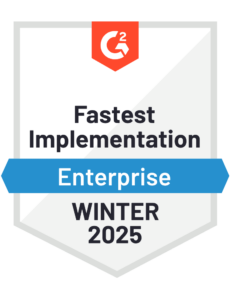Gen AI Won’t Take Your Job—The Person Who Knows How To Use It Will
Blog post
Share
This blog was written by Trintech CEO Darren Heffernan and originally appeared on Fast Company. It is republished with permission.
Investing in the right talent, data, and governance is critical in creating a strong foundation to build upon with machine learning.
Humans have questioned the power and motives of artificial intelligence (AI) for years. Movies like Ex Machina (2014), Her (2013) and A.I. Artificial Intelligence (2001) have all explored the depth of AI’s understanding and possession of humanity long before the name “ChatGPT” meant anything to most of us.
Pop culture’s obsession with AI’s capability to experience the breadth of human emotion—from compassion to cruelty—points to a deep-seated fear of the unknown. Once you step away from the big screen, anxieties shift from total AI world domination to the lesser, but still jarring, possibility of AI taking human jobs.
But, if implemented carefully and strategically, it’s far more accurate to think of AI in the workplace as a “coworker” that makes its colleagues’ jobs easier. Investing in the right talent, data, and governance is critical for creating a strong foundation to build upon with machine learning.
Right off the bat, it’s crucial to understand the limitations of AI, in and out of the workplace, and align on goals and best practices. AI, particularly large language models (LLMs) and Generative AI (Gen AI), can perform remarkable feats when it comes to processing and generating natural language, images, and audio, but they are far from autonomous entities. AI requires constant monitoring, fine-tuning, and human judgment to function effectively.
PwC’s 22nd Annual Global CEO Survey revealed that nearly 60% of global CEOs believe AI will surpass the impact of the internet revolution, potentially contributing $15.7 trillion to global GDP by 2030.
AI’s potential is immense, but its successful implementation requires a thoughtful approach. It’s not enough to deploy AI into existing processes; these processes must be optimized and automated to fully realize AI’s benefits. The initial training period eventually leads to an ongoing feedback loop governed by the context of the business in which it exists.
The Importance of Human Capital
So, what does this mean in practice?
It means one of the most common mistakes companies make when investing in AI is failing to also invest in the people who will use the technology. Training employees to understand and utilize AI tools is as important as the technology itself. These individuals identify where AI can add value and where it cannot, ensuring AI is applied effectively and ethically.
AI is only as good as the data it’s given. Understanding the business environment surrounding data demands broad, human thinking—a capability that remains beyond the reach of today’s AI and will continue to be for the foreseeable future. Organizations that appreciate AI’s shortcomings and invest in upskilling their workforce and hiring the next generation of professionals will be primed for success.
Gen AI and the Future of Finance
Take the world of finance and accounting, for example. Traditionally, accountants have spent hours in spreadsheets on repetitive, manual tasks like the financial close. Working on such tasks often places blinders on accountants, whether they know it or not.
If you’re used to seeing a problem through only one lens, you’re unlikely to bring novel solutions to the table. AI offers a more sophisticated toolset that can handle the complexities of modern finance. With AI handling routine functions, accountants are free to instead focus on the sort of value-additive activities that drew them to the profession in the first place, like translating data into forward-thinking insights.
This shift not only increases efficiency but also enhances job satisfaction with employees engaging in more meaningful work and feeling more integral to the company’s functioning and mission.
Building a Scalable AI Strategy
At our company, we’ve taken a measured and thoughtful approach to integrating AI into our operations, focusing not on automation for its own sake but on enhancing the capabilities of our workforce. We recognize that with AI, we have been handed a once-in-a-generation opportunity to revolutionize every aspect of our business—from product configuration to customer service and relationship management.
To drive this innovation, we’ve established multiple development centers across the U.S., Europe, and our new India entity, fueling our Innovation Lab’s ability to source cost-effective talent.
Our Innovation Lab is dedicated to exploring and experimenting with the latest AI technologies to ensure we stay at the cutting edge of financial automation. One of the key outcomes of this lab is the development of our proprietary large language model (LLM).
This LLM is specifically trained on financial close processes and customer data, allowing us to automate and enhance various tasks, such as customer support, where it synthesizes knowledge from multiple sources to provide accurate and efficient resolutions. Additionally, the LLM leverages the power of GenAI to simplify complex tasks within our financial close applications, streamlining processes that were previously time-consuming and intricate.
Investing In the Human Aspect of AI
AI integration is a marathon, not a sprint. The earliest adopters will see the most significant gains, but only if they tread carefully, thoughtfully, and with a heavy human hand.
Organizations face a mandate to successfully implement AI solutions into their operations, but expectations need to be right-sized. The reality is that LLMs need to be constantly monitored and tended to if they are going to actively make a meaningful impact. As we spend more time leveraging AI, we will also come to realize that there are certain processes that should never be fully automated.
By investing in the human aspect of managing AI and machine learning tools, business leaders can empower their employees to provide timely and relevant data to make better business decisions, grow revenue, improve efficiencies, and better manage risk and compliance.

Darren Heffernan, Chief Executive Officer, Trintech, has spent over 30 years in finance and operational roles driving innovation in the technology space.






